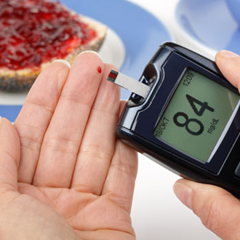Talking Diabetes: What Not To Say

Find Your Perfect Match
Answer a few questions and we'll provide you with a list of primary care providers that best fit your needs.
You don’t mean to be insensitive. You’re trying to be supportive. But when you talk about diabetes to people who have it, chances are you’ve said some things that may have been unintentionally hurtful.
Living with diabetes is challenging.
The constant monitoring of blood sugar, insulin injections, and careful food choices isn’t easy. It can be overwhelming. And inappropriate language can add to the frustration of having diabetes.
Learn what to say and what not to say with this diabetes etiquette primer.
|
Instead of saying this: |
Say this: |
|
It could be worse. |
Something encouraging and supportive “It could be worse” implies that having diabetes is no big deal when, in fact, it is a big deal. |
|
You’re diabetic. |
You have diabetes. A person with diabetes is much more than the label “diabetic.” Avoid the label to recognize that they have an identity outside of diabetes. |
|
You shouldn’t have let this happen. |
Say nothing. There is a genetic reason why many people develop diabetes. Don’t assume they did something that caused it |
|
You’re doing pretty good for a diabetic. |
Say nothing. Don’t pass judgment by telling someone they are doing well. To someone who has diabetes, this could sound condescending. |
|
Illness or disease |
Condition “Disease or illness” can sound like diabetes is contagious, or that the person is sick. |
|
Struggling, fighting, or suffering from diabetes |
Managing diabetes People with diabetes can have a happy, comfortable quality of life. Avoid the negative connotation that is implied by “struggling,” “fighting,” or “suffering.” |
|
Should you be eating that? or Can you eat that? |
Say nothing at all People with diabetes know what they can and cannot eat. Don’t ask. It’s really none of your business. If you’re preparing a meal for someone with diabetes, ask, “Would you rather have this? Or this?” |
|
Testing blood glucose |
“Testing” implies you’ll pass or fail. It can sound judgmental. |
 A Few More Do’s and Don’ts
A Few More Do’s and Don’ts
- Don’t tell horror stories about people with diabetes. It isn’t helpful.
- Do offer encouragement, support, and love.
- Do join people with diabetes in their efforts to eat healthy and exercise.
- Don’t offer advice about what to eat. Many common beliefs about diabetes are out of date, which means your advice may be unfounded or potentially harmful.
- Do be kind. And keep in mind that sometimes it’s best to say nothing at all.
Find Your Perfect Match
Answer a few questions and we'll provide you with a list of primary care providers that best fit your needs.
Sources: diaTribe.org; A Sweet Life magazine; BeyondType1.org; TheDiabetesCouncil.com




